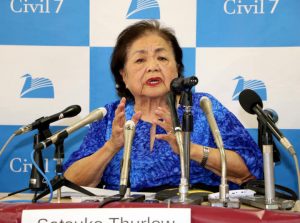Setsuko Thurlow calls G7 Hiroshima Summit “huge failure,” Nihon Hidankyo also offers stinging criticism
May 22, 2023
by Fumiyasu Miyano and Kaori Ota, Staff Writer
On May 21, Setsuko Thurlow, 91, an A-bomb survivor who had returned from Canada to her hometown of Hiroshima, held a press conference in the city’s centrally located Naka Ward, during which she expressed disappointment regarding the summit meeting of the G7 (Group of Seven industrialized nations). Upon conclusion of the Hiroshima Summit’s three-day schedule, she said, “It was a huge failure. I couldn’t feel any warmth or even pulse in the G7 leaders’ statements.”
During the summit, the G7 leaders visited the Hiroshima Peace Memorial Museum, located in the city’s Naka Ward, for the first time together and spoke with an A-bomb survivor. What they viewed in the museum and their reactions were not made public. “Did they really understand what we had experienced? I wanted to hear their feedback,” said Mr. Thurlow.
About the summit’s “Hiroshima Vision” concerning the issue of nuclear disarmament, she explicitly expressed disappointment due to the document’s lack of reference to the Treaty on the Prohibition of Nuclear Weapons (TPNW). “The document sounded as if it had been prepared beforehand by someone at the Ministry of Foreign Affairs. Thinking this might be the only result of my coming all the way to Hiroshima leaves my heart broken.”
Meanwhile, on the same day, the Japan Confederation of A- and H-Bomb Sufferers Organizations (Nihon Hidankyo) held an online press conference and shared its own critical view of the summit outcome. Sueichi Kido, 83, secretary-general of Nihon Hidankyo, emphasized that the meeting effectively condoned the concept of nuclear deterrence and lacked sufficient debate about eliminating nuclear weapons. “Our hope was totally crushed. The meeting seemed to fuel war waged under the nuclear umbrella,” Mr. Kido said angrily.
Masako Wada, 79, one of the confederation’s assistant secretary-generals, noted that Japan Prime Minister Fumio Kishida had a huge responsibility as the summit’s chair for not including in the summit’s final statement concrete measures to realize a world without nuclear weapons. “He trampled underfoot the wishes of the A-bomb survivors,” said Ms. Wada. Michiko Kodama, 85, another assistant secretary-general of the organization, pointed out that the statements made by the G7 leaders were insufficient. “What did the leaders have in mind when they offered flowers at the cenotaph and what kind of pledges did they make? Was it mere ceremony?” she said. “I was hoping to hear each leader’s candid statements.”
(Originally published on May 22, 2023)
On May 21, Setsuko Thurlow, 91, an A-bomb survivor who had returned from Canada to her hometown of Hiroshima, held a press conference in the city’s centrally located Naka Ward, during which she expressed disappointment regarding the summit meeting of the G7 (Group of Seven industrialized nations). Upon conclusion of the Hiroshima Summit’s three-day schedule, she said, “It was a huge failure. I couldn’t feel any warmth or even pulse in the G7 leaders’ statements.”
During the summit, the G7 leaders visited the Hiroshima Peace Memorial Museum, located in the city’s Naka Ward, for the first time together and spoke with an A-bomb survivor. What they viewed in the museum and their reactions were not made public. “Did they really understand what we had experienced? I wanted to hear their feedback,” said Mr. Thurlow.
About the summit’s “Hiroshima Vision” concerning the issue of nuclear disarmament, she explicitly expressed disappointment due to the document’s lack of reference to the Treaty on the Prohibition of Nuclear Weapons (TPNW). “The document sounded as if it had been prepared beforehand by someone at the Ministry of Foreign Affairs. Thinking this might be the only result of my coming all the way to Hiroshima leaves my heart broken.”
Meanwhile, on the same day, the Japan Confederation of A- and H-Bomb Sufferers Organizations (Nihon Hidankyo) held an online press conference and shared its own critical view of the summit outcome. Sueichi Kido, 83, secretary-general of Nihon Hidankyo, emphasized that the meeting effectively condoned the concept of nuclear deterrence and lacked sufficient debate about eliminating nuclear weapons. “Our hope was totally crushed. The meeting seemed to fuel war waged under the nuclear umbrella,” Mr. Kido said angrily.
Masako Wada, 79, one of the confederation’s assistant secretary-generals, noted that Japan Prime Minister Fumio Kishida had a huge responsibility as the summit’s chair for not including in the summit’s final statement concrete measures to realize a world without nuclear weapons. “He trampled underfoot the wishes of the A-bomb survivors,” said Ms. Wada. Michiko Kodama, 85, another assistant secretary-general of the organization, pointed out that the statements made by the G7 leaders were insufficient. “What did the leaders have in mind when they offered flowers at the cenotaph and what kind of pledges did they make? Was it mere ceremony?” she said. “I was hoping to hear each leader’s candid statements.”
(Originally published on May 22, 2023)








